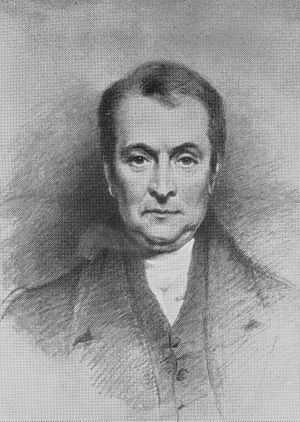John Kidd (chemist) facts for kids
Quick facts for kids
John Kidd
|
|
|---|---|
 |
|
| Born | 10 September 1775 |
| Died | 7 September 1851 (aged 75) |
| Nationality | English |
| Scientific career | |
| Fields | Chemistry Geology |
John Kidd (born September 10, 1775 – died September 7, 1851) was an English doctor, chemist, and geologist. He was very important in helping science grow at Oxford University in the early 1800s.
Contents
Early Life and Studies
John Kidd was born in Westminster, London. His father was a naval officer. John went to Christ Church, Oxford for his education.
A New Chemistry Professor
In 1801, Kidd started teaching chemistry at Oxford. By 1803, he became the first Aldrichian Professor of Chemistry. He also decided to teach about mineralogy (the study of minerals) and geology (the study of Earth's history).
Teaching Geology at Oxford
Kidd gave his geology lessons in the dark rooms under the Ashmolean Museum. Many famous geologists, like William Buckland, learned from him there. Kidd was a very popular teacher. Because of his hard work, Oxford University created a special position for geology. This position, called a "geological chair," was first held by William Buckland.
Important Scientific Works
John Kidd wrote two important books about geology. These were Outlines of Mineralogy (1809) and Geological Essay on the Imperfect Evidence in Support of a Theory of the Earth (1815). These books helped start a new way of studying geology at Oxford. This new way focused on the idea of a great flood, known as diluvial theory.
Becoming a Doctor and Librarian
In 1818, Kidd became a member of the Royal College of Physicians. This is a group for doctors. In 1822, he became a main professor of medicine at Oxford. Later, in 1834, he was put in charge of the Radcliffe Library. This is a famous library at Oxford.
The Bridgewater Treatises
In 1822, John Kidd was chosen to be a member of the Royal Society. This is a very old and respected group for scientists. In 1830, he was asked to write one of the eight Bridgewater Treatises. These books were meant to show how God's power and wisdom could be seen in nature.
Kidd's Book on Nature
Kidd's book, published in 1833, was called "Adaptation of External Nature to the Physical Condition of Man." It was written for everyone, not just scientists. He wanted to protect readers from ideas that went against religious beliefs. Kidd wrote for people who already believed in God. He did not try to argue with those who did not.
See also
- Bridgewater Treatises
 | Calvin Brent |
 | Walter T. Bailey |
 | Martha Cassell Thompson |
 | Alberta Jeannette Cassell |

